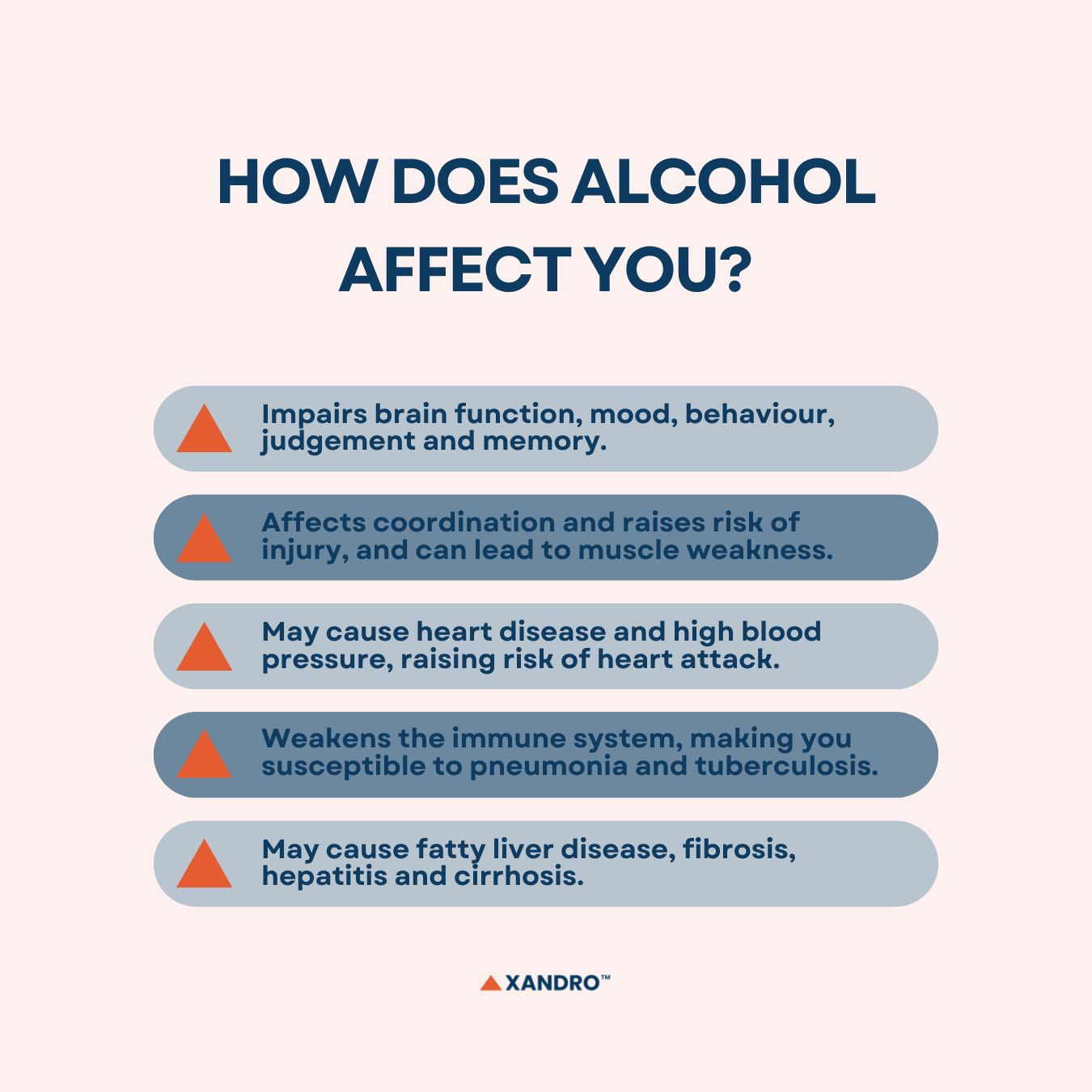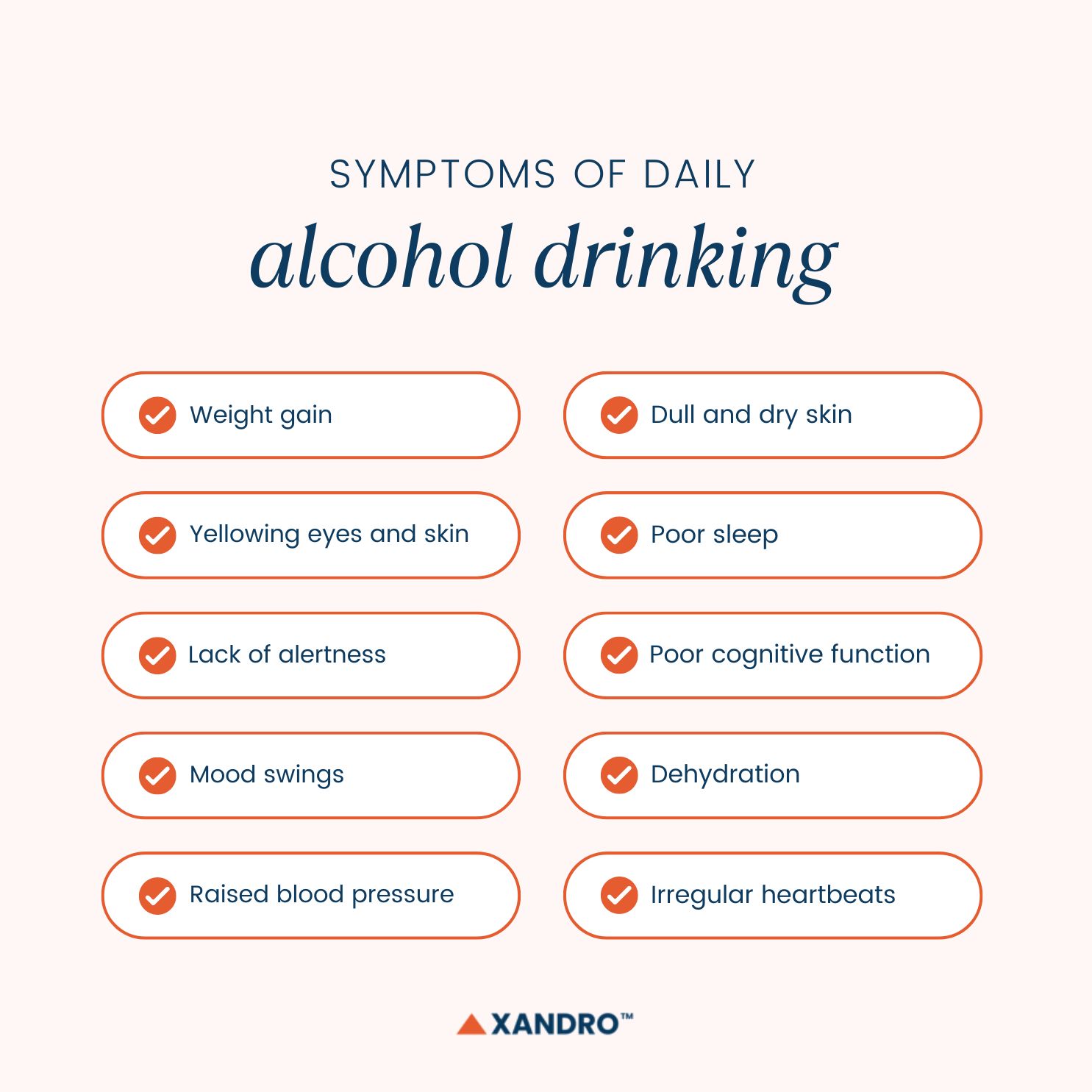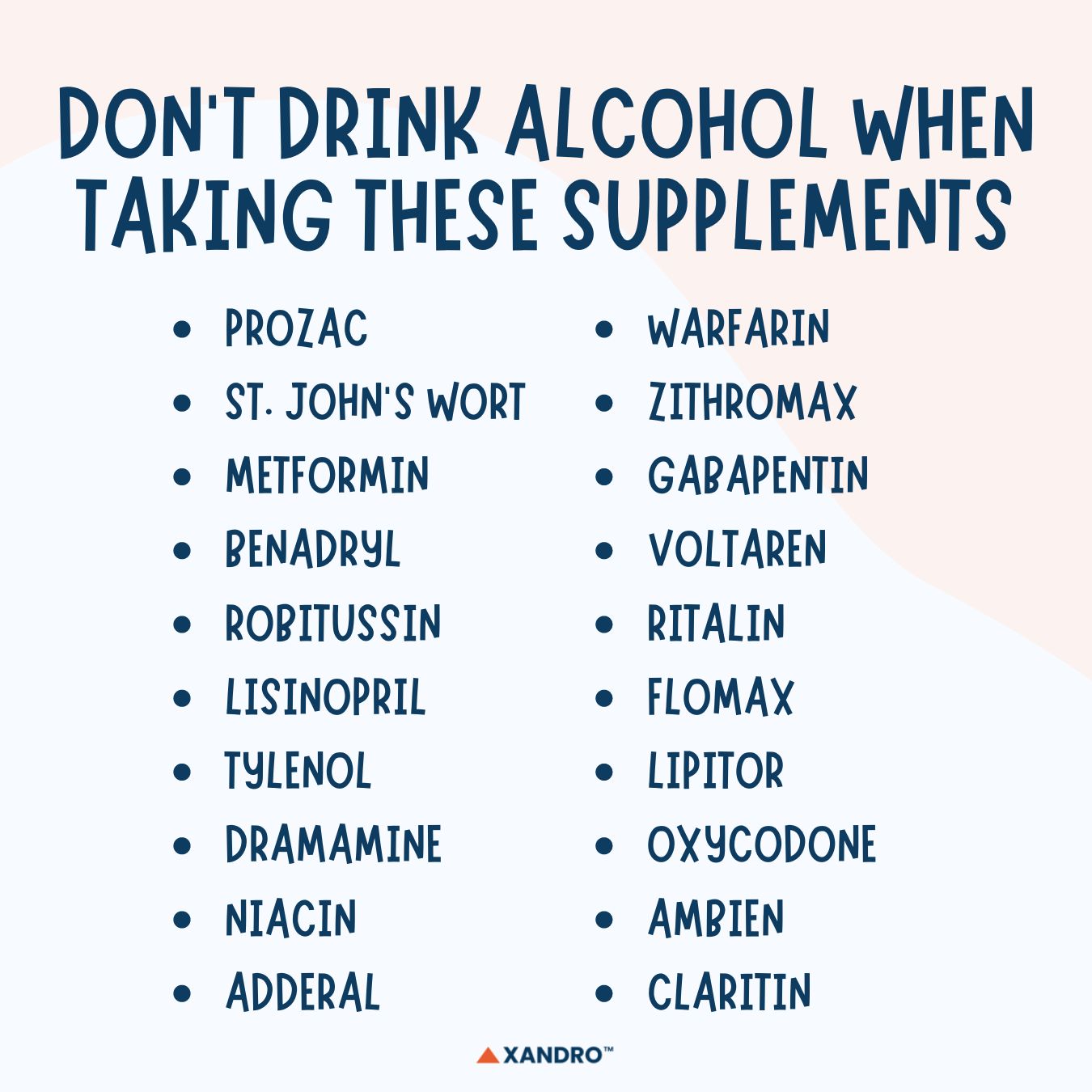Alcohol Drinking Guide: Supplements and Alcohol
17th Aug 2024
How to Drink Alcohol When Taking Supplements
In this article, we talk about alcohol and drinking alcohol when taking supplements.
Jump there now:
- 5 Alcohol Effects
- Is There a Right Way to Drink Alcohol?
- Supplements and Alcohol
- What Not To Mix With Alcohol
Alcohol initially makes you feel relaxed and happy by releasing endorphins in the brain, but as you continue to drink, the positive effects diminish and the negative effects — such as impaired thinking, bloating and mood swings — take over. This shift is known as the biphasic effect.
When consumed, alcohol quickly enters the bloodstream and affects various organs. For example:
- Brain and Nervous System: Alcohol impairs brain function, affecting mood, behaviour, judgment and memory. Excessive drinking can damage the nervous system, leading to neuropathy, brain damage or even death.
- Bones and Muscles: Alcohol impacts coordination, increasing the risk of injury. As for ‘What does alcohol do to your muscles?’ long-term use can lead to muscle weakness, osteoporosis and fractures.
- Heart: While moderate drinking might offer some heart protection, excessive drinking can cause heart disease, arrhythmias and high blood pressure, raising the risk of heart attack and stroke.
- Immune System: Alcohol weakens the immune system, making it harder to fight infections. Chronic drinkers are more susceptible to illnesses like pneumonia and tuberculosis.
- Liver: The liver, responsible for detoxifying the body, is heavily affected by alcohol. Prolonged use can cause conditions like fatty liver, hepatitis, fibrosis and cirrhosis, which can be life-threatening.
Further Reading: Supplements and Nutrients to Boost the Immune System

When thinking about how to drink alcohol, know that alcohol affects everyone and is never completely safe. How much you drink is your choice but the less you drink, the lower the risk of side effects.
How much alcohol is safe to drink daily?
Government guidelines differ, but healthy men and women should aim to drink no more than 10 standard drinks a week. Further, they should aim to drink at most, four standard drinks in a day.
What happens when you drink alcohol every day?
If you’re drinking alcohol each day, you’re most likely in the alcoholic stage and you will begin to notice changes in your appearance and body. You may experience:
- Weight fluctuations
- Dull and dry skin
- Being flushed
- Yellowing eyes and skin
- Lack of sleep and consequential dark circles and under-eye puffiness
- Lack of alertness
- Poor cognitive function
- Worsening mental health
- Poor physical health
- Dehydration
- Raised blood pressure
- Irregular heartbeats
- Increased risk of pre-existing cardiac diseases
- Increased risk of kidney disorders and kidney disease
Further Reading: All About Weight Management

What is a standard drink?
This also differs from country to country. For example, in the UK and Iceland, it’s 8g of alcohol, in Australia, New Zealand, Singapore and Japan it’s 10g, in Germany and Portugal it’s 11g and in Switzerland, Denmark and Sweden it’s 12g.
What is the proper drinking of alcohol?
As for the healthiest way to drink alcohol, there are ways to keep safe while drinking.
- Eat before and while drinking to help the alcohol absorb slowly.
- Drink slowly.
- Count your standard drinks.
- Pace yourself, keeping busy while drinking.
- Don’t be pressured to drink more than you want to.
- Try low-alcohol alternatives.
When should I not drink alcohol?
There are certain situations where drinking alcohol can be highly detrimental to your health. For example, if you’re trying to get pregnant or are pregnant, if you’re taking any of the above medications, if you know you have an alcohol use disorder or if you have medical issues that can worsen due to alcohol, you should not drink alcohol.
Children should avoid alcohol for as long as possible and should not drink until they are of legal age. This is 18 years old in Singapore, although this generally ranges from 18 to 21, depending on the country.
First of all, does alcohol interfere with supplements?
Yes. While not all, there are a variety of supplements that alcohol interferes with, and you need to use caution when taking them.
Is it okay to drink alcohol while taking supplements? You should never use alcohol to wash down supplements or medications and it can cause adverse reactions and even prevent the supplements from absorbing into your body.
Once you have sobered, taking vitamins after drinking alcohol can actually give you the nutrients you need to fix the damage the alcohol has caused, especially for chronic drinkers.
There are many hangover cures out there but other than time, there is no scientific evidence behind taking supplements to cure a hangover. But what about supplements to take before drinking alcohol?
For example, in Korea, you will find anti-hangover food items/supplements ranging from drinks to gummies, often containing vitamin C, milk thistle, taurine and vitamin B — it’s a huge industry. It’s important to note that these have mixed scientific studies for their benefits. Milk thistle, for example, currently has some studies showing it improves liver function, but there is no scientific evidence showing it prevents hangover symptoms.
Alcohol can interact dangerously with various medications, leading to severe side effects. Below is a breakdown of how alcohol interacts with different medication groups.
Depression and Anxiety Medications
Combining alcohol with antidepressants or anxiety medications, especially MAOIs (monoamine oxidase inhibitors), can lead to severe health risks such as blood pressure spikes, overdose and worsening depression. Medications like Zoloft, Prozac and Xanax should not be mixed with alcohol. Also, herbal supplements like St. John’s Wort and Kava can cause liver damage when combined with alcohol.
Diabetes Medications
Mixing alcohol with diabetes medications can cause dangerously low blood sugar levels, rapid heartbeat and nausea. Drugs like Metformin, Glipizide and Glyburide require caution when drinking alcohol.
Further Reading: Supplements for Diabetics
Cold or Allergy Medications
Alcohol worsens the drowsiness and dizziness caused by cold and allergy medications, leading to individuals having bad judgment and an increased risk of overdose. Avoid alcohol if taking medications like Benadryl, Claritin or Robitussin.
Blood Pressure Medications
Alcohol can dangerously interact with blood pressure medications, causing dizziness, fainting and heart problems. Medications like Lisinopril, Amlodipine and Clonidine should not be mixed with alcohol.
Sleep Aids
Combining sleep aids with alcohol can lead to severe sedative effects, including breathing difficulties, memory problems and strange behaviour. Medications like Ambien, Lunesta and herbal supplements such as valerian should be avoided with alcohol.
Pain Medications
Mixing alcohol with pain medications, including OTC and prescription drugs, can cause dangerous side effects like stomach bleeding, liver damage and overdose. These include Tylenol, Vicodin and Oxycodone.

Heartburn and Nausea Medications
Alcohol can negatively interact with heartburn and nausea medications, leading to rapid heartbeat and an increased risk of overdose. Avoid alcohol if using drugs like Dramamine, Tagamet and Reglan.
Cholesterol Medications
Combining cholesterol medications with alcohol increases the risk of liver damage, stomach bleeding and other side effects. Speak with your doctor before drinking if you take medications like Lipitor, Zocor or Niacin.
Prostate Medications
Alcohol can cause dizziness and fainting when combined with prostate medications, such as Flomax, Cardura and Hytrin.
ADHD Medications
Mixing alcohol with ADHD medications can lead to dangerous interactions, including overdose, impaired concentration and heart problems. Medications like Adderall, Ritalin and Vyvanse should not be combined with alcohol.
Arthritis Medications
Alcohol can cause ulcers, liver damage and stomach bleeding when combined with arthritis medications. Avoid drinking if you take medications like Celebrex, Naproxen or Voltaren.
Seizure Medications
Combining alcohol with seizure medications can lead to serious side effects, including dizziness, sleepiness and an increased risk of seizures. Medications like Gabapentin, Dilantin and Lamictal should not be mixed with alcohol.
Infection Medications
Mixing alcohol with antibiotics, antifungals or antiparasitics can cause severe side effects such as liver damage, stomach pain and a sudden drop in blood pressure, so make sure to avoid alcohol when taking medications like Zithromax, Flagyl or Nizoral.
Other Medications and Supplements
Certain other medications, such as Coumadin (warfarin) and Isordil (isosorbide), can cause internal bleeding, heart attack or stroke when mixed with alcohol. Also, high doses of vitamins A, D, E and K may also lead to or worsen liver damage when combined with alcohol.
Always speak with your doctor or pharmacist to ask about possible interactions between alcohol and the medications and supplements you’re taking.
Best vitamins for heavy drinkers
Heavy drinkers should look into taking a range of vitamins as alcohol abuse often causes nutrient deficiencies. This is because alcohol prevents the proper absorption of these. These include:
- Vitamins B1, B3, B6, B9 and B12
- Vitamin C
- Vitamin A
- Vitamin D
- Vitamin K
- Magnesium
- Selenium
- Calcium
- Iron
- Zinc
- Potassium
Further Reading: Magnesium Glycinate FAQs Part 1
You can get these in a multivitamin. As mentioned above, be careful with taking high doses of vitamins A, D, E and K when drinking alcohol.
The vitamins above, along with omega-3 fatty acids, can help the liver recover from alcohol misuse.
End Note
While no amount of alcohol is completely safe, make sure to drink responsibly to reduce your risk. Always be aware of potential risks, especially when taking medications or supplements, and consult your doctor to stay safe.
To help boost your vitamin levels, consider taking
Xandro Lab supplements. Our Magnesium Glycinate and Calcium AKG, for example, can benefit your sleep and muscles from alcohol use! Try them today!
